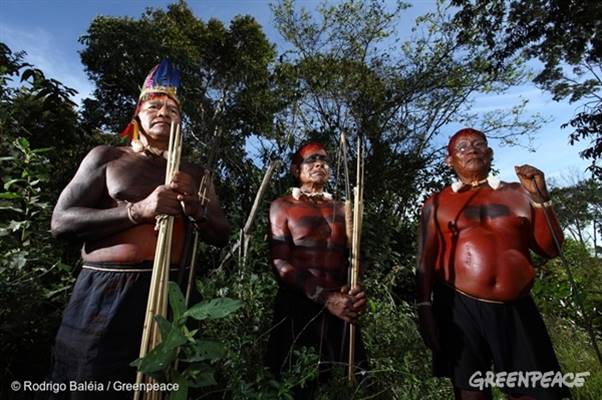For Indigenous activists defending their traditional lands, Brazil is one of the most dangerous places in the world.
Xavante indigenous people from Maraiãwatsede with traditional body paint for war. Due to conflicts over land ownership, this traditional painting is now a daily ritual in the lives of Indians.
Last year alone, 50 environmental activists – including Indigenous activists – were murdered in Brazil for standing up to illegal logging, mining and agribusiness.
The injustice isn’t limited to violence. Indigenous Peoples in Brazil also face years of red tape and bureaucracy to get their lands officially recognised and protected, giving industry plenty of time to move in and damage their territory.
Many Indigenous communities – like the Guarani-Kaiowa – have been fighting for their land for hundreds of years, and still haven’t received the recognition and support they need from the Brazilian government.
A growing global spotlight
While the situation on the ground is bleak for many Indigenous communities in Brazil, the denial of their rights is getting more attention globally.
This week, the United Nations Human Rights Council (UNHRC) joined the conversation after the Brazilian Indigenous movement’s request for involvement. The UNHRC released a new reportthat details the numerous ways the rights of Indigenous Peoples of Brazil are being violated: from the excruciatingly slow process for officially recognising Indigenous territory, to the development of large infrastructure projects – like the Belo Monte and São Luiz do Tapajós mega-dams– without full Indigenous consent.
The report outlines how important a quick land recognition process is for keeping Indigenous territories from being damaged: “The urgency for land demarcation is exacerbated by deforestation, destruction of rivers and depletion of soil quality due to intensive monocropping and mining activities, all of which render land and water inadequate for sustaining indigenous peoples’ lives.”
However, the Brazilian government’s answer didn’t recognize the criticisms, and their speech doesn’t match with the reality. For example, they said that the Munduruku Indigenous People were consulted about the construction of the mega dam that would flood part of their land and cause a huge impact in their way of life. “It is a lie. We were never consulted, the government made a quick meeting once, but it was far away from a consultation that should be made by law”, said Arnaldo Kaba, general cacique (chief) for Munduruku people.
This response raises a question whether the Brazilian government will listen and follow the guidelines of the UNHRC at all.
But all of us can stand with the Indigenous Peoples of Brazil wherever we are in the world, and amplify their struggle. Right now, the Munduruku people of the Brazilian Amazon are still working to receive official recognition of their territory after over decades of effort. Add your name to stand with the Munduruku People.


